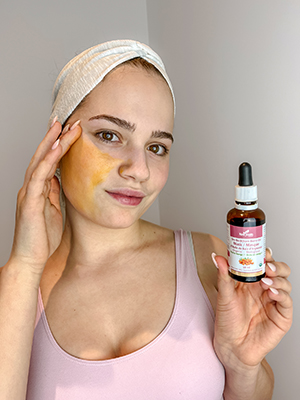Sea Buckthorn Berry Oil: Your Secret Weapon for Sensitive, Dry, or Reactive Skin
Sunny days are here, and while many women simplify their regular skincare routines, those with sensitive or problem skin might be more hesitant to go make-up–free. Nurturing your body from the inside out is always ideal, but complementing your nutrition with nutrient-rich topical products can help heal and protect your skin from the outside.
Sea buckthorn berry oil, a true gift from nature, is rich in complex phytonutrients, omegas, and antioxidants. Read on to discover how this little berry oil can help revitalize your skin, from replenishing moisture to supporting cellular rejuvenation.
Beneficial for Various Skin Conditions
Sea buckthorn berry oil is particularly effective for a variety of skin conditions. For those suffering from eczema, the oil’s anti-inflammatory properties can help soothe irritation and reduce redness. It also aids in managing rosacea by calming inflamed skin and minimizing flare-ups. Acne-prone individuals can benefit from its low comedogenic rating, ensuring hydration without clogging pores. Additionally, the oil’s regenerative properties make it an excellent choice for healing scars or sunburned skin and for reducing the appearance of fine lines and wrinkles.[i] ,[ii] ,[iii] ,[iv] ,[v]
You will love the benefits of sea buckthorn berry oil for nutrient-rich, pore-friendly hydration and rejuvenation.
Key Components and Benefits
Essential Fatty Acids
Sea buckthorn oil is rich in essential fatty acids, including omega-3, -6, and -9, which are crucial for maintaining healthy skin. They help strengthen the skin’s natural barrier, preventing moisture loss and dehydration due
to environmental stressors like pollution and UV radiation. Rare omega-7, abundant in sea buckthorn berries, aids in skin repair and regeneration, benefiting problem skin and supporting overall skin health.
Antioxidants and Vitamins
Sea buckthorn contains a high concentration of antioxidants, such as vitamins C and E, flavonoids, and carotenoids. These antioxidants neutralize free radicals, protect the skin from oxidative stress, and reduce inflammation and redness. Vitamin C is essential for collagen production, which gives the skin structure and elasticity. By promoting collagen synthesis, sea buckthorn berry oil helps reduce signs of aging, such as fine lines and wrinkles.
Lipids and Sterols
The complexity of sea buckthorn berry oil lies in its composition of intricate lipids, each playing a vital role in nurturing healthy skin. Sterols fortify the epidermal barrier, locking in moisture and restoring the skin’s firmness and elasticity at a cellular level. Glycolipids and phospholipids, other essential lipids present in sea buckthorn berry oil, exhibit anti-inflammatory properties and support cellular health, fostering skin regeneration.
 Application Guide
Application Guide
- Pull hair away from your face (tied back or with a headband). Have a designated cloth on hand, because sea buckthorn berry oil permanently stains fabrics.
- Place up to 15 drops in your hand and gently massage into face, neck, décolletage, dry patches, or any other area requiring extra care.
- Wash your hands and relax for 30 minutes (or longer) to let the oil’s nutrients get absorbed.
- Using a gentle soap or cleanser, wash away pigment and excess oil with warm water and pat dry with your designated cloth.
NOTE: Always be mindful of where you apply the oil and where you will relax, as oil transfer can easily happen, and it will permanently stain whatever material it touches.
How often is best for you?*
|
SKIN TYPE |
MASK FREQUENCY |
|
Dry, scarred, sunburned |
2–3 times per week |
|
Mature |
1–2 times per week |
|
Oily, acne-prone |
1–2 times per week |
|
Sensitive, eczema, rosacea |
1 per week |
* Ensure you patch-test before use to avoid any potential reactions.
 Dr. Melanie Kusznireckyj, BSc, ND
Dr. Melanie Kusznireckyj, BSc, ND
A naturopathic doctor, graduate from the CCNM. She has a private family practice in Montreal, is the VP for the Quebec Association of Naturopathic Medicine, and is the Chief Operating Officer at Vitazan Professional.
[i] Lubeck, B. “Uses and Risks of Sea Buckthorn: Can sea buckthorn skin creams make a difference?” VeryWellHealth.com. Updated 2024-03-02. https://www.verywellhealth.com/the-benefits-of-sea-buckthorn-89947
[ii] Koskovac, M., S. Cupara, M. Kipic, A. Barjaktarevic, O. Milovanovis, K. Kojicic, and M. Markovic. “Sea Buckthorn Oil—A Valuable Source for Cosmeceuticals.” Cosmetics, Vol. 4, No. 4 (2017): 40.
[iii] Wang, Z., F. Zhao, P. Wei, X. Chai, G. Hou, and Q. Meng. “Phytochemistry, health benefits, and food applications of sea buckthorn (Hippophae rhamnoides L.): A comprehensive review.” Frontiers in Nutrition, Vol. 9 (2022): 1036295.
[iv] Abdullahzadeh, M., and S. Shafiee. “To compare the effect of sea buckthorn and silver sulfadiazine dressing on period of wound healing in patients with second-degree burns: A randomized triple-blind clinical trial.” Wound Repair and Regeneration, Vol. 29, No. 5 (2021): 732–740.
[v] Zielińska, A., and I. Nowak. “Abundance of active ingredients in sea-buckthorn oil.” Lipids in Health and Disease, Vol. 16 (2017): 95.

 Stores
Stores